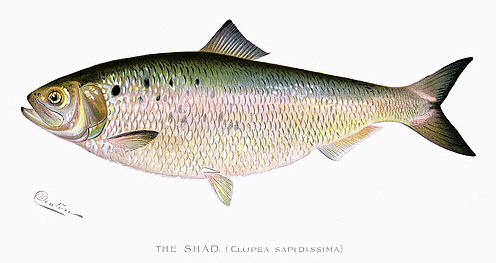This was clearly not something most people worried much about then (before the environmental movement of the 1970s), a worry in itself. Perhaps that realization helped contribute to my lifelong concern about "sustainability": long-term viability for people and planet. I discuss consequences and sustainability in the last chapter of my book.
The problem, of course, is that desirable long-term consequences like sustainability often mean sacrifices now. Yet, both as individuals and societally, we do sometimes make rational long-term choices, foregoing more immediate rewards.
 In honor of Presidents' Day in the US, I thought it might be appropriate to provide an example from our early history. In his book The Founding Fish, John McPhee comments on one little-known example of how consequences eventually brought about conservation--but it took some disasters along the way. The American Shad was a major source of protein for Native Americans and European settlers alike. While Native Americans had set up some fish-catching weirs, their harvest was sustainable. Europeans set up so many of them that downstream weirs began taking too many of the returning fish, so that upstream weirs caught very little. As a consequence, in the early 1700s, the colonial Pennsylvania legislature passed laws forbidding these obstructions entirely, and requiring the removal of existing ones. These laws were largely ignored, leading to a full-scale battle in 1738 in which lives were lost. These fish were that important. Later, additional sustainability laws were passed. For example, only a few years before the Declaration of Independence, fishing in the Schuylkill River was banned from Saturday after sunset to sunrise on Monday (1771).
In honor of Presidents' Day in the US, I thought it might be appropriate to provide an example from our early history. In his book The Founding Fish, John McPhee comments on one little-known example of how consequences eventually brought about conservation--but it took some disasters along the way. The American Shad was a major source of protein for Native Americans and European settlers alike. While Native Americans had set up some fish-catching weirs, their harvest was sustainable. Europeans set up so many of them that downstream weirs began taking too many of the returning fish, so that upstream weirs caught very little. As a consequence, in the early 1700s, the colonial Pennsylvania legislature passed laws forbidding these obstructions entirely, and requiring the removal of existing ones. These laws were largely ignored, leading to a full-scale battle in 1738 in which lives were lost. These fish were that important. Later, additional sustainability laws were passed. For example, only a few years before the Declaration of Independence, fishing in the Schuylkill River was banned from Saturday after sunset to sunrise on Monday (1771).
It was a start.
No comments:
Post a Comment